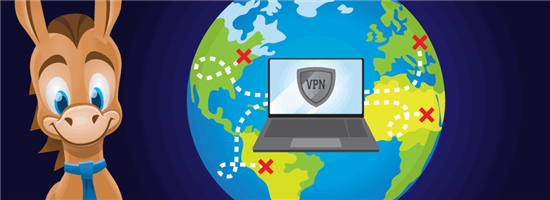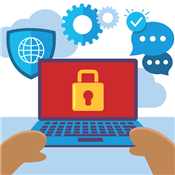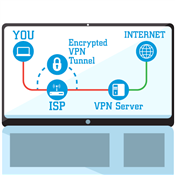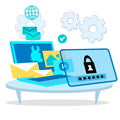Best VPN: Top Comparison List
VPNs promise to protect your privacy, but not all of them can deliver on that promise. Which VPNs are the safest? Read our guide to find the best VPN for you.
 |
| © CreditDonkey |
Essentially, a VPN services does two things:
- It "encrypts" your signal, hiding your online activity from anyone who might be eavesdropping.
- It manipulates your IP address, so you appear to be from a different location/country.
There are plenty of reasons why someone would want to use a VPN service. We discuss some of the reasons below.
Why Use a VPN
 |
| © CreditDonkey |
Protection Against Identity Thieves
The internet can be a dangerous place. Think of all the sensitive information you share online like:
- Passwords
- Personal details
- Bank account and credui card info
Hackers and identity thieves can steal this information. They use it to drain your bank account, charge your credit cards, and commit fraud.
A VPN service encrypts your data, so your information stays private even when on an unsecured public network. Anyone spying on your connection won't understand the data because it's encrypted.
Encrypting is the process of converting data into a code. The idea is to conceal its content. A VPN service encrypts the data your computer sends and receives. Hackers and ISPs won't be able to decipher this information, hiding your activity online.
Bypass Country Web Restrictions
Certain countries, like Egypt, Afghanistan, and China, limit their users' access online.
In these countries, you may not be able to use sites like Facebook or WhatsApp messaging. This can be inconvenient, especially if you use these tools for work.
Similarly, you could be traveling and want to watch home-specific broadcasts. You might want to catch up on the local news, watch your favorite sports team or check out streaming videos.
A VPN service allows you to "tunnel" your way out of these restrictions.
A VPM also lets you set where you'd like to "appear" from. By manipulating your location, you can bypass restrictive networks. This allows you to access any website and watch shows from any location.
P2P File Sharing
File sharing is another reason to use a VPN service. An app like BitTorrent itself isn't illegal. But downloading copyrighted material without permission is.
Hide Search History
There are plenty of reasons to hide your search history. First, search engines often catalog your web searches. They attach it to your IP address and customize the ads you see.
While this may be useful, you don't want your search history stored and used against you.
You don't have to be doing something wrong to want privacy.
Imagine researching anxiety online and having "anti-depression pills" ads appear next time you go online.
Or what if you're a reporter who covers sensitive topics like war crimes, violence, or human trafficking. You may even be a law enforcement officer investigating cybercrimes.
There are many good reasons to want privacy. A VPN service can offer you that.
What Is a VPN, and How Does It Work?
 |
| © CreditDonkey |
VPN stands for Virtual Private Network. It's basically a secure "tunnel" between two devices.
VPNs hide what you do online. You can surf the web, check emails, and access online services privately. Hackers won't be able to monitor or steal your information.
Usually, the tunnel is between a VPN server and your PC. When using a VPN service, the data exchanged is encrypted. This means the information you send and receive is private.
It also hides your IP address, so you can't be traced. Hackers, governments, and even internet service providers won't know it's you. They won't know what sites you browse, either.
Now that you know how a VPN works, here's a few things to think about when choosing a VPN service.
What to Look for in a VPN
VPN Client Speed
Speed is one of the most important things in a VPN service. A slow VPN client will ruin your online experience.
There's no point in getting a secure connection if you can't get anything done. When choosing a VPN service, make sure it's as fast as your normal internet speed.
ExpressVPN is known for their consistently fast connections. With servers in many different countries, it's easy to pick a server with the best speed. This is useful for file sharing or streaming content.
Security and Privacy
VPNs are designed to keep your identity and activity secret. It's important to know if their service is reliable.
Take note where the business is based, too. If it's based in a country with data retention laws, then your information is less secure.
Extended Features
Certain VPN providers have more features than others.
Things like kill-switch and split-tunneling are useful for advanced users, but make the program less user-friendly. Other providers have double encryption, making the connection more secure.
However, this slows down the connection. Choose a VPN service which fits your budget and needs.
Broken features are a sign that the VPN is probably not of the highest quality, and may infact be disclosing your private information.
High Quality
Not all VPN's are created equal. VPN's that are of higher quality will truely work to keep you secure and private.
- Located in Jurisdiction Outside of 14 Eyes Countries
- Good Performance Throughout Server Network
- All Features Work
- Supports OpenVPN Protocol
- Strong Encryption Standards
- Offers Money Back Guarantee
- Good Track Record/History
What to Avoid with VPN's
Not all VPN's are safe and keep your anonymity. When choosing a VPN you should be weary of any that:
- Leak IP addresses or DNS requests.
- Expose identity, location, and/or browsing history to third parties.
- Have broken features.
- Kill switch or leak protection which doesn't work.
- Share data with third parties.
- Free VPNs (they make money off of selling your data).
You should check with the VPN's disclosure terms before you pick one to make sure your information is safe. If you're already using an unsafe VPN, it's best to switch.
Best VPN Service
There's no single best provider - it all depends on your budget and needs. Here are our recommendations for each service, and what they're best for.
Best VPN for speed: ExpressVPN
 |
ExpressVPN
- Subscription:
- $12.95/month
- $9.99/month (6-month subscription)
- $8.32/month (12-month subscription)
Pros:
| Cons:
|
Our Review: ![]()
![]()
![]()
![]()
![]()
ExpressVPN is one of the fastest providers. They have 1700+ servers around the world. These servers are spread across 148 cities in 94 countries.
Also, ExpressVPN doesn't keep logs. They don't store information on any of their users or their activity. This is important if privacy is a top concern for you.
They're based in the British Virgin Islands, which have no data retention laws. They're not forced to keep information on their users.
ExpressVPN uses a feature called split tunneling. This allows you to select which applications use the VPN, and which ones don't (e.g. Firefox and Chrome).
It also plays nice with streaming services. Meaning you can use Netflix and Hulu while using their service.
Data retention laws require ISPs to store information on their users' internet activity. This information must be kept in case the police need it for a criminal investigation.
Countries like Panama and the British Virgin Islands don't have data retention Laws. VPN services which operate from there aren't required to keep track of your online activity.
To put it simply, they have no records on their users - making it more secure.
The downside is that ExpressVPN is much more expensive than other VPN services. Even with a 15-month subscription, you'll pay $8.33/month. In contrast, NordVPN only costs $3.29/month for a two-year subscription.
Nevertheless, they do offer a 30-day money back guarantee. If you're not happy, you could get a full refund, no questions asked.
Here's the pricing for ExpressVPN's plans:
- 1 month: $12.95
- 6 months: $59.95 (average $9.99/month)
- 15 months (including free 3 months): $99.95 (average $8.33/month)
Because of its speed and user-friendly interface, we also like ExpressVPN for Android. The dedicated Android app is simple and easy to use. It also has consistently fast speeds, with servers across 94 countries.
ExpressVPN also has instructions on how to install the app, among other video guides. If you have a problem, you they have 24/7 customer support via live chat.
Best VPN for price and speed: NordVPN
 |
NordVPN
- Subscription:
- $11.95/month
- $6.99/month (12-month subscription)
- $4.99/month (24-month subscription)
- $3.49/month (36-month subscription)
Pros:
| Cons:
|
Our Review: ![]()
![]()
![]()
![]()
![]()
If you're looking for a VPN service with great value and fast speeds, go with NordVPN. For a two-year subscription, you'll pay an average of $3.29/month - a little more than the price of a cup of coffee.
NordVPN also has fast speeds with over 3,200 servers in 60 countries.
NordVPN is one of the more secure VPN servers. It has a simple interface for the Windows OS, with user-friendly options. You can easily customize the apps you'd like to have under the "kill-switch" option.
Also, the "Double VPN" feature passes your data through two separate VPN servers, so it's almost impossible to track. NordVPN also allows traffic over the TOR network, for when you want to be even more anonymous.
We like that NordVPN supports up to six connections simultaneously. This works well if you use multiple devices and want a secure connection for all of them.
It also has a double encryption feature. Most companies only have one layer of encryption. NordVPN has two, making their network more secure.
The downside is that this will slow your internet speeds. It's recommended only if you have a fast connection.
Another great feature of NordVPN is the "kill switch." This ensures that your connection is always safe. Even if you get disconnected, it won't expose you.
Like any network, sometimes you'll get disconnected. This happens even to VPN servers. When this happens, your machine tries to reconnect to the internet. You could unknowingly reconnect via your regular internet connection.
A "kill switch" feature prevents this. When disconnected, it stops your device from reconnecting. This forces you to reconnect manually, through the VPN server.
NordVPN is based in Panama. Like the British Virgin Islands, they have no data retention laws. They don't have records of their users, making them a secure provider.
NordVPN has a good money back policy. First, you can try them out with their free, three-day trial. After that, they have a 30-day money back guarantee.
Here's the pricing for NordVPN's plans:
- 1 month: $11.95
- 1 year: $69 (average $5.75 monthly)
- 2 years: $79 (average $3.29 monthly)
Best VPN for Kodi: IPVanish
 |
IPVanish
- Subscription:
- $10.99/month
- $9.99/month (3-month subscription)
- $7.49/month (12-month subscription)
Pros:
| Cons:
|
Our Review: ![]()
![]()
![]()
![]()
![]()
Kodi is a free, open-source media player. It can access all kinds of content, including videos and music. You can run that content on any device with Kodi, including TV, laptops, phones, and tablets.
You can also install add-ons, which lets you access streaming content. Some, like Netflix, require a subscription. But there are also add-ons that let you watch movies and TV shows for free.
IPVanish is a good VPN service for Kodi. Plenty of users install Kodi on the Fire TV Stick or Android TV Box.
IPVanish works well with both devices. They also have apps for Android, Windows, Mac OS-X, iOS and routers. Whichever device you use to connect to Kodi, you can use IPVanish too.
 |
What we like about IPVanish is their interface. It's simple and easy to use. For desktops, the interface opens to a quick connect menu. By default, you'll connect to the nearest server.
However, you can easily change this to a preferred country or city. You can even choose a specific server domain using simple drop-down menus.
IPVanish also allows multiple streams at once. You can connect to five devices with IPVanish.
They also have over 1,000+ servers in 60+ countries. This allows you to switch locations, so you can get content from different countries.
Using IPVanish is tricky in China. The server domains are blocked, but the IP addresses are not.
If you want to use it, you'll have to set the IP addresses manually. It's not too hard, but it's certainly more tedious. Also, you might miss out on some of the features this way.
IPVanish only offers a trial version for Apple iOS users. For other platforms, you have seven days to request a refund if you're not happy with the product.
Here's the pricing for IPVanish's plans:
- 1 month: $10.00
- 3 months: $26.99 (average $8.99 monthly)
- 1 year: $77.99 (average $6.49 monthly)
Best VPN for privacy and geo-blocking: VyprVPN
 |
If privacy and security is your main concern, we recommend VyprVPN. It's been in business for six years, so it's a company with experience.
Most of the VyprVPN's team are in the US. However, their parent company, Golden Frog, is based in Switzerland. It's a country with good privacy laws, so your data is protected.
However, take note of VyprVPN's logging policy: your real IP address, VyprVPN address, and connection logs are stored for 30 days. The company claims that's for billing and troubleshooting, and they don't keep track of users' traffic.
VyprVPN has a unique feature: their Chameleon scrambling technology. This feature allows you to bypass restrictions such as China's firewall. It also makes ISPs harder to spot you or monitor your traffic.
Another thing we like about VyprVPN is that they don't work with third-parties. This means they have their own servers, network, and hardware. Being in full control of the entire process makes it more secure.
 |
VyprVPN has only two price plans: basic and premium. The basic account lets you connect three devices at the same time.
The premium account has additional features, like the Chameleon technology. You can also control your own cloud VPN server. Premium lets you connect five devices at the same time.
- The basic plan costs $9.95 a month, if you subscribe monthly. If you choose to subscribe for a year, you pay $60 annually ($5/month).
- The premium costs $12.95 for the monthly subscription. It you choose to subscribe for a year, it costs $80 (average $6.67/month).
For Mac, we like VyprVPN. It has the "Connection per App" feature, which lets you choose the connection you want on a per-app basis. This gives you greater control over your online privacy.
It also has extensive security features and protocols, like VyprDNS and OpenVPN, as well as their Chameleon protocol to bypass VPN blocking.
Best value VPN: IvacyVPN
If price is your greatest concern, we like IvacyVPN. It has some of the lowest prices in the market:
- $11.95 per month with a monthly subscription
- $39.95 for one year (an average of $3.33 per month).
- $49 for two years (average of $2.04 per month).
It also has a user-friendly interface. The options provided are simple. You can choose to either unblock websites or torrent. Just pick what you want to do. The app does everything else.
The downside is that it's quite basic. It doesn't have advanced features like "kill switch" or "split tunneling." If you want those features, it's better to look at ExpressVPN or NordVPN. But Ivacy lets you connect five devices on one account.
This VPN does have its drawbacks. For one, Ivacy VPN is based in Singapore. Singapore is listed as one of the countries that works with the "Five Eyes" countries. Even though Ivacy has a true "no-logging" policy, this may change in the future.
The "Five-Eyes" are countries which share intelligence with each other. They are Australia, Canada, New Zealand, the United Kingdom, and the United States.
Other countries may work together with the "Five-Eyes" countries. Usually, it's an agreement to exchange information.
VPN companies operating in these countries may be forced to reveal user logs by law.
Also, while Ivacy does have a seven-day return policy, it's limited. You can't use more than 500MB in data. You can't exceed 30 sessions either. This isn't clearly stated on their website.
Still, if you're a casual user, Ivacy is a viable choice. The limited functions make it simple and user-friendly.
BEST VPN FOR ONLINE ANONYMITY: ZORRO VPN
If you're looking for the best VPN for online privacy, ZorroVPN is for you.
It's a great location for privacy, since it has no ties to any major surveillance states like the US and UK. They also update a monthly warrant canary on their site, so users would know in case a warrant is served to the company.
As for the VPN, ZorroVPN was designed for maximum privacy and security. For starters, they only use OpenVPN AES-256 bit encryption with 4,096 bit authentication. That's the gold standard for today's online security and encryption.
It's great news in terms of security. However, the downside is ZorroVPN isn't a choice for those who can only use other security protocols.
They also allow you to combine VPN chains, the Tor network, and proxies in custom OpenVPN configurations. That's a powerful combination of security features. No other VPN offers all these features together.
Combined with ZorroVPN's high- level encryption, you'll have one of the most powerful methods for protecting your privacy online. The extra security may take a toll on your speed, but if privacy is your main concern, ZorroVPN offers more than other providers.
In other words, you'll need to use a third-party software to install ZorroVPN on your devices.
For those who like custom VPN apps, this will be a downside. However, for experienced users, this is a benefit. Most proprietary VPN apps are buggy anyway, and don't work well. Third-party apps on the other hand, are usually more secure and stable with regular updates.
ZorroVPN currently has servers in 47 different countries around the world, and they allow for torrents and P2P networks. They don't have a limit on data and bandwidth either, so you're free to download as much as you'd like.
- 1 month: $15
- 2 months: $25 ($12.50/month)
- 3 months: $36 ($12/month)
- 6 months: $68 ($11.30/month)
- 12 months: $120 ($10/month)
They also have a 7-day money back guarantee.
In short, ZorroVPN is for people who are serious about VPNs. Their prices may be a little higher, but for those who prioritize privacy and security, it's a small price to pay.
There are plenty of free VPN services out there. So do you need to pay for one? Read on to learn more.
Wait, Why Should I Pay for a VPN?
Here are some reasons it's worth paying for a VPN.
For Security and Privacy
Many free VPN services don't tell you which protocol they use. They might only use 128-bit encryption. It's not bad, but not the strongest.
Worse still is if they use an outdated protocol, like point-to-point tunneling protocol (PPTP). PPTP is fine if you just want to access content from other countries. But if security and privacy are main concerns, you'll need a better connection.
Paid VPN services offer more secure connections. These connections are encrypted with the latest technology. It's usually 256-bit encryption. That's the strongest encryption around - even the military uses it.
This means your information is protected. Hackers, governments, and identity thieves can't read this information (or at least, it would be very difficult to do so).
Paid VPN services can also afford to develop their system in-house. This means they get to control the entire process. They can write their own programs and buy their own hardware. This makes it more secure.
Free VPN services may need to outsource some parts of the business to a third-party. Since they're cutting costs, you won't know if it's a reputable dealer. The vendor may not be as reliablle, which may cause a weakness in the system.
For Better User Experience
Even if you don't care about privacy, paid VPN services provide better services. You get faster speeds and unlimited data usage.
Free VPN services will need to lower their costs. They usually have a monthly data cap. Or they may even limit your internet speed. You can't use them for torrenting or file sharing.
Free VPN services also still need to cover their overhead costs. They might have ads with their services. Or worse, they'll sometimes sell your information to advertisers. This means even your activity isn't 100% private.
Also, paid VPN services provide better customer service. This is important, especially if you use the internet a lot. If there's a problem, you don't want to wait to have it fixed. Paid VPN services usually have a customer service chat or hotline on standby, 24/7.
There are a few, but on a limited basis.
- Windscribe
- Tunnelbear (free version)
- Hotspot Shield Free VPN
Other Options
TOR (The Onion Router)
TOR is free software that you can use to browse the internet anonymously. Unlike VPN services that know your IP address, TOR encrypts your traffic and bounces it around. Here's how it works:
First, TOR adds layers of encryption around the information before sending it out. Once it goes out, it has to go through several stops or "nodes" before arriving at the destination.
Each node undoes a layer of encryption, peeling it like an onion (hence the name). By the time the data reaches the destination, all the encryption has been completely peeled off. Your information is unencrypted by the time it gets to its final destination.
Each node will only know the destination before and after it. It won't know where the source node is. That way, the original sender remains anonymous.
This method isn't foolproof. Hackers and ISPs can still see the unencrypted data between the exit node and the destination. If you provided any personal information, it can still be traced back to you.
Another downside of TOR is that it slows down your connection considerably. It's not a good method for file sharing or gaming.
A VPN, on the other hand, not only changes your server location, but also encrypts your data. It provides a "tunnel" from your PC to the VPN server, and then from the server to the website.
Throughout this process, the data is encrypted, making it more secure than TOR. But, if you're just looking to surf and remain anonymous, the TOR browser is a good choice.
Proxy servers
In a regular connection, your IP address connects directly with the website you're trying to access. Your ISP - and anyone controlling the network - can see what you do online.
To restrict access, your ISP or network provider simply needs to build a firewall. This firewall stops your IP address from connecting to certain sites.
This is how countries like China and Malaysia block users from accessing certain sites. However, you can set your connection to connect via a proxy server.
Your connection will first go through the proxy server. The server then relays that information to a site. Like a VPN service, it creates a "tunnel" through any geo or network restrictions.
This method can be useful if you just want to surf websites blocked by your ISP. However, there is an issue of compatibility. Certain sites or services aren't compatible with proxy servers. For example, games, VoIP, and other traffic types may have problems with forwarding requests.
In contrast, VPNs are designed to work with all traffic, whether it's compatible with a proxy or not. Additionally, VPNs also encrypt your data for better security and privacy.
Examples of proxy servers include Google, hide.me, Hidester, and ProxySite.com
Cyberghost
 |
Cyberghost is a VPN service that has been around since 2011. It supports Windows, Mac, iOS, Android, Linux, and routers. You can also use it with Kodi.
They have 1,300 servers worldwide, and they offer unlimited data and traffic. They have fast speeds too. This is perfect for streaming and/or sharing files. Cyberghost works with P2P file sharing and BitTorrent clients too.
Security-wise, the company uses 256-bit encryption, which is the highest level of security. They have a strict no-logs policy. It helps that their business is based in Bucharest, Romania, which is outside of the Five-Eyes network.
They also have the "kill-switch" feature, and protect against DNS and IP leak protection.
Their price is a bit more expensive than other providers, but not by much.
- 1 month: $11.99
- 1 year: $71.88 (average $5.99/month)
- 2 years: $84 (average $3.50/ month)
- 3 years: $99 (average $2.75/month)*
*This was advertised as a promotion in February 2018 - prices may have changed since then.
They also have a 30-day, money back guarantee. If you don't like their service, simply ask for a refund within 30 days.
TunnelBear VPN
TunnelBear is a Canadian-based VPN provider. What we like about TunnelBear is that it's user-friendly. It can be used with a wide range of clients, which covers both desktop and mobile devices.
If you're new to VPN, we recommend starting with TunnelBear. It has 256-bit encryption, and connects five devices at the same time.
TunnelBear has servers in 20+ countries. That isn't as many as other providers, but it's reasonable for the casual user.
 |
TunnelBear offers a free trial. The free version does come with a 500MB/month data cap. It's not a lot, but we think it's fair for a free trial. The downside is that they don't offer a refund. We recommend trying it out before subscribing.
Also, take note: the business is based in Canada. That's one of the "Five-Eyes" countries. Still, they're transparent about their privacy policy. That makes them a bit more trustworthy in our eyes.
- Little: Free trial version (500MB/month cap).
- Giant: $9.99/month
- Grizzly: $59.88 for 1 year (average $4.99/ monthly)
Perfect Privacy
Perfect Privacy is a Switzerland/ Panama-based VPN company that's been around since 2008. They're one of the most expensive (but also secure) VPNs on the market.
They have a modest network of servers, with about 40+ servers in 23 countries. However, their security features are top-notch.
In 2017 they developed their NeuroRouting feature. It's a server multi-hop ability which makes your online activity harder to track.
On top of that, they also have their own TrackStop filter, which is a VPN ad blocker. It protects you against cookies, malware, phishing sites, and other tracking methods like browser fingerprinting on the VPN server itself.
Perfect Privacy also has one of the best no-log policies we've seen. Other companies often claim to have 'no logs' yet add disclaimers at the end. Perfect Privacy on the other hand, only has your login credentials, account expiry date, and email address.
They specifically state that they don't store IP addresses, access times, duration, or bandwidth caused by individual users. They only have general server information, which is displayed on their website.
In fact, since they have no way of tracking your personal activity online, they stress on user responsibility on their website. If you are going to use a lot of bandwidth, they ask that you split it across several servers.
Of course, you'd be taking their word for all this. However, we do feel like Perfect Privacy takes their no-log policy seriously.
While that sounds great, Perfect Privacy's biggest downsides are that it's not Netflix-compatible, nor are they user-friendly. It's truly for people who don't mind paying extra for security.
- 1 month: €12.99
- 3 months: €35.95 (€11.98/month)
- 6 months: €65.95 (€10.99/month)
- 12 months: €119.99 (€9.99/month)
- 24 months: €214.95 (€8.95/month)
They also offer a 7-day money back guarantee.
All in all, if privacy is your biggest concern and money is no object then Perfect Privacy is a solid choice.
VPN AREA
VPNArea is a small, Bulgarian-based company founded in 2012. They have over 200 servers in 70 countries. That isn't many compared to giants like ExpressVPN or PIA, but it's not necessarily a bad thing either.
VPNArea claims that they have one of the lowest customer-to-servers ratio on the market. Fewer customers and more servers should mean faster speeds for everyone.
Unlike ExpressVPN, which need thousands of servers for their huge customer base, VPNArea simply makes sure they don't have more customers than they can handle. This should mean faster speeds for users.
Now bear in mind, fast speeds are a good thing - but having fewer servers also means fewer locations to connect to. And if the closest server to your intended destination is still far away, your connection is going to be slow no matter what.
Surprisingly, VPNArea is okay with you sharing your account. They allow up to 6 connections per account, which is enough to share it with a friend or two. That may make it cheaper since you can split the cost.
Also, VPNArea allows for P2P file sharing, and doesn't throttle your bandwidth. You and your friends can use it without worrying about using too much data.
Streamers will be happy to know that VPNArea works with streaming services like Netflix and BBC iPlayer. They've also got all the standard VPN security features - speed-testing, kill-switch, auto ip-changer, obfuscation, and others.
Finally, VPNArea also offers a dedicated IP address upgrade. You can get your own static IP and private VPN server, for as low as $20/year.
- 1 month: $9.90
- 12 months: $59 ($4.92/month)
- 36 months: $107.64 ($2.99/month)
They also have a 7-day money back guarantee.
All in all, VPNArea isn't a bad choice - if you're looking for a VPN for streaming and sharing, VPNArea has all the perks you'll need.
VPN.AC
VPN.ac is another small VPN provider based in Romania. They've got a decent network of self-hosted servers in 21 countries around the world. The downside is, most of them are in Europe and the US.
Their security features are good, and they offer OpenVPN with 256-bit AES encryption. That's the strongest security protocol available right now.
If you're using older devices or connection, they have L2TP/IPsec and PPTP protocols too.
VPN.ac keeps no logs, for the most part. They do however keep connection logs to their VPN service, to see how the service is being used by all their users. It's to ensure that their service is running smoothly.
But don't worry - logs are kept on a separate, encrypted server at an undisclosed location. They also erase these connection logs daily.
On that note, VPN.ac has good customer support. They have an experienced staff in security and networking. They don't do externalized support or ticket escalation either.
If you have any problems, they promise that you'll be talking to people with the right technical skills to help you.
VPN.ac has apps for Windows, Mac, Android, and iOS devices. They can also be used with routers like DD-WRT, Tomato, Advanced Tomato, OpenWRT, AsusWRT/Merlin, and pfSense.
Each account can have up to 6 connections. If you need more connections, you can install VPN.ac directly on your router - that gives you blanket protection for all your devices.
Unfortunately, they don't support Netflix, or Tor. If you want streaming capabilities and/or better privacy features, you're better off with other providers instead.
- 1 month: $9
- 3 months: $24 ($8/month)
- 12 months: $58 ($4.80/month)
- 24 months: $90 ($3.75/month)
They also have a 7-day money back guarantee.
All in all, VPN.ac is a good VPN service, but it's not exceptional. If you like their prices and server locations, there's no harm in giving them a try.
Other VPNs are more basic. They are beginner-friendly and easier to use. However, they're not as secure.
When choosing a VPN, choose one that fits your budget and needs.
Frequent Questions
How does a VPN service work?
Before you connect to the internet, you first connect to your Internet Service Provider (ISP). Your ISP then connects you to the sites you want to visit.
Your internet traffic passes through your ISP. They know exactly which sites you go to, and when. They can track your activity online.
When you use a VPN service, your traffic runs through the VPN server instead. The VPN server then connects with the sites you want to visit. It receives the information and sends it back to you.
However, the information between your computer and the server is encrypted. Only you and the VPN server can "see" it.
With a VPN, your ISP won't know what you do online. They can't "see" the information going to your computer. Secondly, they won't know which sites you visit. They can only see that you're connected to the VPN server.
What is split-tunneling?
Split-tunneling let you choose which apps or programs you want to use your VPN for. For example, maybe you'd like to use a VPN for your browser, but not your games.
Split-tunneling allows you set it so that your games use your regular internet connection. This is useful if you don't want certain apps to slow your VPN speed.
Will my internet slow down with a VPN service?
Basically, yes. Connecting to a VPN service will never be as fast as your regular connection.
First, the data must be encrypted. This takes processing power. Even with a fast computer, adding a step slows down the process. However, this doesn't slow your internet speed by much.
What really slows down your connection is the server location. Depending on which VPN server you choose, the information will take longer to travel.
If you choose a server close to you, then it's faster. If you choose a server far away from you, it takes longer.
Why are there so many VPNs? What makes them different?
What really sets VPNs apart are their features. Certain VPNs have features such as kill-switch and split tunneling. They're more secure, but require some experience to configure.
How do I get the best speed out of my VPN?
You can generally expect slower speeds when you connect to servers further from your location. So the solution is to connect to VPN servers closest to your location.
Although, some VPN services oversell their servers, resulting in congestion, low bandwidth, dropped connections, and slow speeds.
What is a VPN protocol, and which one should I use?
Protocols dictate how a VPN works. Basically, it determines how secure a VPN is, and how the VPN interacts with other programs and software. Different protocols are recommended for different purposes and scenarios.
- Opt for OpenVPN when available, especially when the setup is handled by a third-party app.
- L2TP/IPSec is probably the most widely used alternative that offers decent security.
- SSTP is also a solid option for Windows users, assuming you trust proprietary tech from Microsoft.
- IKEv2 is a fast and secure alternative for the few devices that support it, particularly mobile devices.
- Only use PPTP as a last resort.
How do I pick the best VPN?
Ask yourself what do you need the VPN for. Then pick the features that fit your budget and needs. There's not one VPN that's best for everyone. Take the time to figure out your specific needs.
Bottom Line
When picking a VPN service, don't just look at the price. Look around to see where they're based. Countries with data retention laws are less secure than countries without.
Check to see that the VPN is using the latest protocols and has 256-bit encryption. Also, make sure the service is compatible with your device.
If you're a casual user, choose a provider with fast speeds and plenty of servers. This will let you access websites, share files, and stream content with no problems.
But if you absolutely rely on privacy, then go with a company with a stellar record. Consider safety features like kill-switch and split tunneling. Also, make sure they have great customer service. This will be important in case something fails.
Write to Khairie A at feedback@creditdonkey.com. Follow us on Twitter and Facebook for our latest posts.
Note: This website is made possible through financial relationships with some of the products and services mentioned on this site. We may receive compensation if you shop through links in our content. You do not have to use our links, but you help support CreditDonkey if you do.
|
|
|










